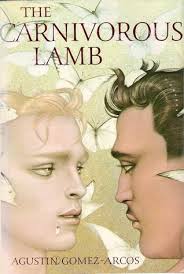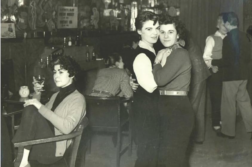 The Carnivorous Lamb
The Carnivorous Lamb
by Agustín Gómez-Arcos
Translated by William Rodarmor
Arsenal Pulp Press. 288 pages, $16.95
I MUST CONFESS that I had never heard of Agustín Gómez-Arcos’ The Carnivorous Lamb before learning of this new translation of the book, which was originally published in 1975, but now I want to read all of his works.
The author’s life itself reads like a novel. Raised in Enix, a town in southeastern Spain, Gómez-Arcos was a goat herder as a child and grew up in a Republican family, which in this Spanish context meant a leftist. Born in the final year of the Spanish Civil War (1936–39), his life would be shaped by the right-wing dictatorship of Francisco Franco that it brought to power. After going to Barcelona to study law, he abandoned his plans of becoming a lawyer when the call to literature proved stronger. He then moved to Madrid, where he pursued his dream of becoming a playwright. In 1962, his play Diálogos de la herejía (“Dialogues of Heresy”) was recognized with an important award, only to be banned by the censors, as were many of his plays. Fed up, Gómez-Arcos decided to leave Spain in 1966. He first went to London and finally settled in Paris in 1968, right after the May events that had shaken the French establishment. In France, Gómez-Arcos became a novelist, writing all of his ensuing works in French, including The Carnivorous Lamb, which won the prestigious Prix Hermès in 1975. The tenth anniversary of his death was noted last March.
The Carnivorous Lamb also opens in the month of March and finds the narrator, Ignacio, following his brother’s invitation, returning to Spain after a seven-year absence. At first the narrator is notably obtuse and the reader has difficulty following the sequence of events. But after this brief introduction of events set in 1974, the rest of the novel takes the shape of a long flashback from the birth of Ignacio in 1949 to the reunion with his brother Antonio in the narrative present. Claustrophobic in its construction, the plot involves a limited cast of characters: the two brothers; their mother Matilde—a sort of Greta Garbo diva clad in black and with a penchant for the color yellow; their father Carlos—a fallen “red” or revolutionary who spends his days buried in his study; and the maid Clara, an anarchist who ironically tries to keep order in a house that’s falling apart. At birth, Ignacio refuses to open his eyes and Matilde seizes this opportunity to play the role of martyr, considering her son a monster needing a miracle to restore his sight. When he finally opens his eyes after sixteen days, his mother is crestfallen, but his brother Antonio quickly takes him under his wing.
The novel traces the development of an incestuous relationship between Ignacio and Antonio, punctuated by erotic scenes that coincide with major religious rituals in Ignacio’s life. For instance, on the day of his baptism, Ignacio reveals that: “While all these rites were being performed, Antonio was gently stroking my behind, one of his fingers carefully probing my asshole. I was burning with pleasure, and a kind of ecstasy must have shone from my face, because the priest said, ‘My son, I can see you are beginning to believe in God. You are becoming His creature.’” In this scene, orgasmic rapture replaces the religious images of mystical revelation so popular in Catholic iconography. Similarly, it is on the day of Ignacio’s first communion that he and his brother consummate their carnal love in a cavern outside of their country house: “Finally he [Antonio] couldn’t control his desire any longer. He pulled down his pants and took me with a thrust of his hips. … It was the longest and shortest moment of my life. I felt it was truly the day of my first communion, and my brother Antonio had chosen it carefully.”
Eventually, the two brothers separate when Antonio goes to work in Venezuela and Ignacio flees the country, but not before burying his mother and father with Clara by his side. After this long flashback, the two brothers are reunited in the country house, but a foreign presence disrupts Ignacio’s hope of picking up exactly where they had left off. Indeed, Antonio brings his new wife Evelyn, a Texan and daughter of his employer. Gómez-Arcos draws a caricature of American imperialism in the figure of the wife, who tries to grab the empty house.
At times Proustian in its sensibility, at others Buñuelesque in its flippancy, The Carnivorous Lamb is a work of great beauty and symbolism. Although the novel is obviously rooted in its Spanish context, it nonetheless carries a universal message of revolt against oppression. The lamb of the title refers to a lambskin made from the hide of a lamb that Matilde had received as a gift for her first communion. In its religious context, the lamb obviously represents Jesus, but in the novel it comes to stand for Catholic repression. But the lamb is also associated with a divided, self-devouring family, thus becoming a political allegory of the Spanish Civil War. The novel’s ultimate terrorist act is the marriage of the two brothers performed by Clara on July 18th, the day chosen by Franco as a national holiday to commemorate the founding moment of his regime. In this framework, the incestuous relationship becomes an act of freedom and reconciliation. (Is it just a coincidence that Spain became one of the first countries to legalize same-sex marriage, in June 2005?)
The volume is published in the Little Sister’s Classics series by Arsenal Pulp Press. The introduction by Sharon G. Feldman is illuminating and erudite. The accompanying appendices consist of a letter by the author and three book reviews, including one by John Rechy. Delicious in its anarchist subversiveness, titillating in its blasphemous transgressions, incisive in its droll irony, The Carnivorous Lamb deserves a place in our libraries as a work of protest against the social and political conventions that circumscribe our lives. As the narrator reminds us, “In any conflict, there is always a precise moment when the enemy starts to lose. We may not always realize it, but that moment acts on us in a special way: it unbolts the gates of the mind and sends our thoughts whirling free. And from then on, slavery ceases to exist.”
Eduardo A. Febles is an assistant professor in the Modern Languages Department of Simmons College.





